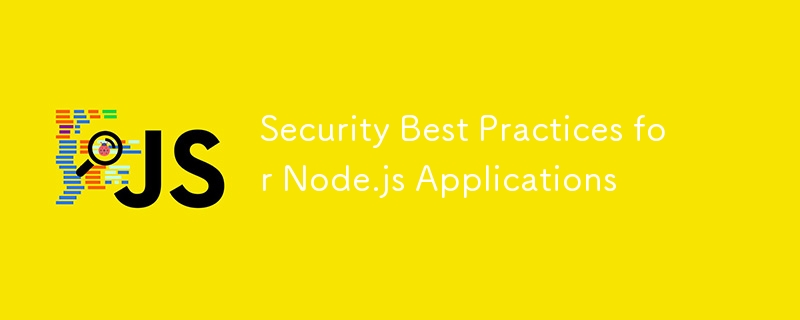

As the use of Node.js in building web applications continues to grow, ensuring the security of these applications becomes paramount. Node.js applications are often exposed to various security vulnerabilities that can lead to unauthorized access, data breaches, and other malicious activities. In this article, we will explore essential security best practices to protect your Node.js applications and safeguard user data.
Before implementing security measures, it's crucial to understand the common vulnerabilities that can affect Node.js applications:
Adopting secure coding practices is fundamental to building secure Node.js applications. Here are some essential practices to follow:
Avoid hardcoding sensitive information, such as API keys or database credentials, directly in your source code. Instead, use environment variables to store secrets securely. You can use the dotenv package to manage environment variables easily.
npm install dotenv
Create a .env file in the root of your project:
DATABASE_URL=mongodb://localhost:27017/myapp API_KEY=your_api_key_here
In your application, load the environment variables:
require('dotenv').config();
const dbUrl = process.env.DATABASE_URL;
const apiKey = process.env.API_KEY;
To prevent injection attacks, always validate and sanitize user inputs. Use libraries like Joi for schema validation or express-validator to validate input data in Express applications.
npm install express-validator
const { body, validationResult } = require('express-validator');
app.post('/register', [
body('username').isLength({ min: 5 }).trim().escape(),
body('password').isLength({ min: 8 }).trim().escape(),
], (req, res) => {
const errors = validationResult(req);
if (!errors.isEmpty()) {
return res.status(400).json({ errors: errors.array() });
}
// Proceed with registration
});
Implement robust authentication and authorization mechanisms to control access to your application:
Always use HTTPS to encrypt data in transit. This prevents attackers from intercepting sensitive information transmitted between the client and server. You can obtain SSL certificates from services like Let’s Encrypt.
Conduct regular security audits of your application to identify vulnerabilities. Use tools like npm audit to check for vulnerabilities in your dependencies.
npm install dotenv
Keep your dependencies updated to ensure you have the latest security patches.
Let’s consider a simple Node.js application that implements several security best practices:
DATABASE_URL=mongodb://localhost:27017/myapp API_KEY=your_api_key_here
Securing your Node.js applications is a continuous process that requires diligence and attention to detail. By following the best practices outlined in this article, you can significantly reduce the risk of security vulnerabilities and protect your users’ data. Implementing these security measures not only helps build trust with your users but also ensures that your application remains robust against potential threats.
Stay tuned for the next article in our series, where we will explore performance optimization techniques for Node.js applications!
The above is the detailed content of Security Best Practices for Node.js Applications. For more information, please follow other related articles on the PHP Chinese website!
 How to become a close friend on TikTok
How to become a close friend on TikTok
 How to set up Douyin to prevent everyone from viewing the work
How to set up Douyin to prevent everyone from viewing the work
 Introduction to common commands of postgresql
Introduction to common commands of postgresql
 transactionscope usage
transactionscope usage
 How to check for plagiarism on CNKI Detailed steps for checking for plagiarism on CNKI
How to check for plagiarism on CNKI Detailed steps for checking for plagiarism on CNKI
 What does the metaverse concept mean?
What does the metaverse concept mean?
 ASCII code comparison table
ASCII code comparison table
 How to open python after it is installed
How to open python after it is installed




